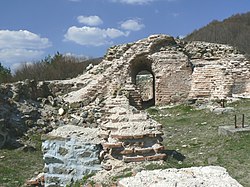Battle of Trajan's Gates
| Battle of the Gates of Trajan | |||||||
|---|---|---|---|---|---|---|---|
| Part of the Byzantine–Bulgarian wars | |||||||
 Ruins of the fortress Gates of Trajan |
|||||||
|
|||||||
| Belligerents | |||||||
| Bulgarian Empire | Byzantine Empire | ||||||
| Commanders and leaders | |||||||
| Samuil of Bulgaria | Basil II | ||||||
| Strength | |||||||
| Unknown | 30,000 | ||||||
| Casualties and losses | |||||||
| Light | Heavy | ||||||
The Battle of the Gates of Trajan (Bulgarian: Битката при Траянови Врата, Greek: Μάχη στις Πύλες του Τραϊανού) was a battle between Byzantine and Bulgarian forces in the year 986. It took place in the pass of the same name, modern Trayanovi Vrata, in Sofia Province, Bulgaria. It was the largest defeat of the Byzantines under Emperor Basil II. After the unsuccessful siege of Sofia he retreated to Thrace, but was surrounded by the Bulgarian army under the command of Samuil in the Sredna Gora mountains. The Byzantine army was annihilated and Basil himself barely escaped.
Fifteen years after the fall of the Bulgarian capital Preslav, the victory at the Gates of Trajan extended the Bulgarian successes achieved since 976. Later on Tsar Samuil moved the capital from Preslav in the northeast to Ohrid in the southwest. The memory of the great victory over Basil II was preserved thirty years later in the Bitola inscription of Ivan Vladislav (1015–1018), the son of Aron.
In addition to the Bitola inscription where the victory of Samuil, commander of the Bulgarian army, is mentioned in summary form, several medieval historians have written accounts for the battle. Among them were Leo the Deacon who was an eyewitness and a direct participant in the campaign; John Skylitzes and two other historians George Kedrin and Joannes Zonaras who repeat the work of Skylitzes. Not only Byzantine historians wrote accounts for the battle, it was also recorded by the Melkite chronicler Yahaya of Antioch and the Armenians, Stephen of Taron (also known as Asolic) and Matthew of Edessa. More details can be found in the commended sermon of Saint Photius of Thessaly.
...
Wikipedia
